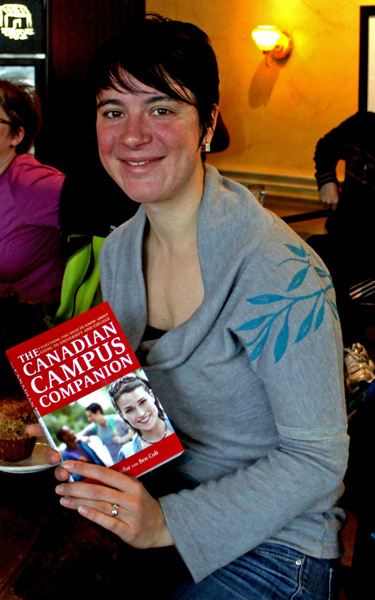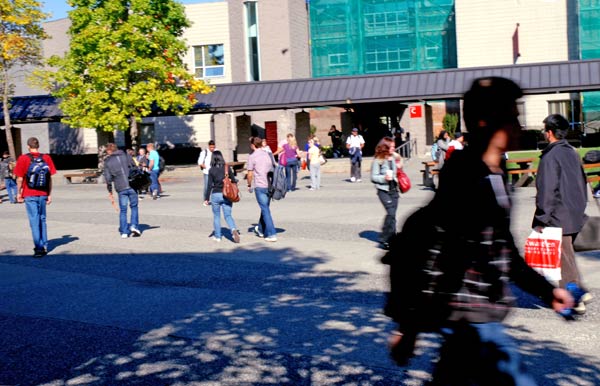Vancouver journalist helping university students with guidebook
April 12, 2011 by Kyle Benning · Leave a Comment

Erin Millar knows too well what it is like to adjust to the post-secondary lifestyle. (Photo by Kyle Benning)
Going into college, Erin Millar thought she was going to be a music teacher.
Now, the Capilano graduate has written The Canadian Campus Companion, a guidebook on going onto post-secondary education in Canada.
The freelance journalist was president of Canadian University Press (CUP) during her time as an editor at the Capilano Courier.
“I really enjoyed [writing] and found my real calling [in journalism],” Millar said.
Millar, who generally writes feature stories, was the first person in her family that attended a post-secondary institution, and she said she learned a lot about the university lifestyle when she moved away from home.
”I remember I moved from Penticton to Vancouver for the first time when I was 18 years old, like everybody else does. It was really challenging. I didn’t know how to do anything. Cap doesn’t have residence, so I had to move into my own place,” Millar said.
“I didn’t even know enough about registering to realize that I had to register myself for English 100. I just sort of assumed I’d show up and I would go to my classes and my program was very set because I was in a very specific program. I didn’t even get all the classes I needed in my first year because I didn’t really realize the process,” Millar said.
Millar co-wrote the book with Ben Coli, her husband, whom she met in Thailand while doing freelance journalism.
“[Coli] went to business school at U of C and worked for a couple years as a property tax consultant and realized that what he really wanted to do was write,” Millar said. “I think we both kind of came at it from other sides, and I think that message is very much in the book to keep your ears open and follow what you really enjoy and it doesn’t necessarily have to be what you expect.”
Millar and Coli got the book deal two days before their April wedding. They started writing the book late, and their deadline was set for Sept. 30 so they could have it on shelves for this spring.
“I feel like the book is a lot better having written it together,” Millar said.
She said that there aren’t many university guidebooks for Canadian institutions and that her book, The Canadian Campus Companion, is the most in-depth university guidebook in the country.
After graduating, Millar found that her passion for writing and journalism was more tempting than a career as a music teacher. She was hired to work full-time by McLean’s Magazine helping with the on-campus website and the university rankings.
Even though she didn’t follow through with her original dream to teach music, Millar keeps her alto saxophone and piano close to her. Millar and her sister are part of a cover band that has been together for seven years.
Kwantlen counts heads, expects record enrolment
October 6, 2009 by Sarah Jackson · Leave a Comment

Students bustle between classes at Kwantlen's Surrey campus, which is busier this year because of an over 10 per cent increase in student enrolment in the institution's university studies. (Sarah Jackson photo)
Kwantlen Polytechnic University’s classes are more crowded this year than ever before, according to a Kwantlen press release.
The 28-year-old institution’s previous record of 17,000 students is about to be shattered, with 14,677 students enroled in courses beginning on or before Sept. 18. Trades programs starting in October, November and December are expected to put the number of students well over the previous record.
Enrolment in university studies, which do not include qualifying studies, trades or technology programs, is 10 per cent higher than last year. All program areas have seen an enrolment increase of five to 10 per cent. There are 11 per cent more course enrolments from students new to Kwantlen than there were last year. The largest growth is in the arts and business programs.
The press release attributed the growth to Kwantlen’s new university status, a new Bachelor of Arts with a Major in English and Bachelor of Science in Integrated Pest Management programs, and changes to the registration system.
Ron Maggiore, Kwantlen’s executive director of strategic enrolment management, said university status creates “greater interest, more applications and more excitement. University status adds value to a Kwantlen diploma or degree without question.â€
The increase could only mean good things, he said. More students produces more revenue for the school, and “more tuition allows for the creativity to do more things.â€
Maggiore said he isn’t surprised by the enrolment increase, referring to a relationship between post-secondary education attendance and the economy. When the economy is strong, enrolment tends to drop; when it sours, enrolment climbs.
The enrolment increase is not limited to Kwantlen, though the institution has the highest recorded enrolment increase of all schools in B.C.
A recent announcement from Simon Fraser Institute declared a record enrolment of 28,275 students this year, a seven per cent increase from last year.
Most of SFU’s increase is in international students, up 33 per cent from last year, transfer students and a doubling of students in faculty of health and environment.
“There seems to be a trend and increase of post-secondary students,†said Mehran Kiai, SFU’s director of enrolment services. “It’s too early to say if it’s because of the economy or other reasons.â€
Kiai believes an improved admissions process and growing reputation are contributing factors to the record enrolment.
Craig MacBride, public affairs officer for the B.C. Ministry of Advanced Education and Labour Market Development, was unable to confirm whether there is a trend in post-secondary education enrolment increases but suggested that one may become apparent when final data is collected this November.
“Historically, anytime it’s a recession [enrolment] goes up in universities. I suspect there is a trend,†said MacBride.


